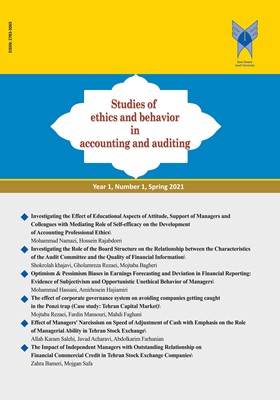Investigating the Role of the Board Structureon the Relationship between the Characteristicsof the Audit Committee and the Qualityof Financial Information
Subject Areas : Ethics and accounting
Shokrollah khajavi
1
*
![]() ,
GholamReza Rezaei
2
,
Mojtaba Bageri
3
,
GholamReza Rezaei
2
,
Mojtaba Bageri
3
1 - Professor, Department of Accounting, Faculty of Economics, Management and Social Sciences, Shiraz University, Shiraz, Iran
2 - Assistant Professor, Department of Accounting, Sistan and Baluchestan University, Zahedan, Iran.
3 - M.Sc., Department of Accounting and Financial Management, Marvdasht Branch, Islamic Azad University, Marvdasht, Iran
Keywords: Disclosure Quality, audit committee independence, Tehran Stock Exchange, Accrual Quality, Board Independence,
Abstract :
The purpose of this research is to study the relationship between audit committee characteristics and financial information quality for the companies listed in Tehran Stock Exchange (TSE). Furthermore, this research is to study the role of board structure on the relationship between audit committee characteristics and financial information quality. Hence, this research utilizes board independence, the board size, and duality as proxies for board structure. The research population composes of total companies listed in the TSE and the sample consists of 143 companies listed in the TSE. The multivariate linear regression is used for testing the hypothesis of the research. The results suggest that there is a positive relationship between audit committee characteristics and financial information quality. Also, the results showed that among board structure variables, only board size has a moderating role in the relationship between audit committee characteristics and financial accrual quality.
اعتمادی، حسین؛ امیرخانی، کوروش، رضایی، محبت (1390). محتوای ارزشی افشای اجباری: شواهدی از شرکتهای پذیرفته شده در بورس اوراق بهادار تهران. بورس اوراق بهادار، 13 (4)، ص 235-252.
بولو، قاسم؛ مرفوع، محمد؛ قهرمانی، آرین (1399). تاثیر کیفیت اطلاعات حسابداری بر هزینه حقوق صاحبان سهام شرکتها با توجه به نقش عدم تقارن اطلاعاتی و قابلیت مقایسه صورتهای مالی. مطالعات تجربی حسابداری مالی، 17 (68)، ص 33-65.
تجویدی، الناز (1387). شفافیت و کارایی بازار سرمایه. حسابدار، 23 (196)، ص 43-34.
حجازی، رضوان؛ رحمانی، علی؛ مظفری، زهرا (1389). بررسی اثر مقررات افشاء اطلاعات بر کیفیت اطلاعات منتشره در شرکتهای پذیرفته شده در بورس اوراق بهادار تهران. بورس اوراق بهادار، 10، ص 36-23.
حساسیگانه، یحیی؛ خیرالهی، مرشد (1387). حاکمّیت شرکتی و شفافیت. حسابدار، 203، ص 74-79.
حساسیگانه، یحیی؛ نادیقمی، ولی (1385). نقش شفافیت در اثربخشی حاکمّیت شرکتی. حسابدار، 179، ص 32-37.
ستایش، محمدحسین؛ کاظمنژاد، مصطفی؛ ذوالفقاری، مهدی (1390). بررسی تأثیر کیفیت افشاء بر نقدشوندگی و هزینه سرمایه شرکتهای پذیرفته شده در بورس اوراق بهادار تهران. پژوهشهای حسابداری مالی، 3، ص 55-74.
شعری، صابر؛ مرفوع، محمد (1386). رابطه درصد اعضای غیرموظف در ترکیب هیأت مدیره و سرمایهگذاران نهادی با پیشبینی سود شرکتها. مطالعات حسابداری، 17، ص 63-104.
مشایخی، بیتا؛ محمدآبادی، مهدی (1390). رابطه مکانیزمهای حاکمیت شرکتی با کیفیت سود. پژوهشهای حسابداری مالی، 3 (2)، ص 17-32.
موسوی شیری، سید محمود؛ حسینزاده، عبدالله؛ حاجیها، زهره؛ نیکومرام، هاشم (1400). ارتباط بین معیارهای کیفیت اطلاعات حسابداری در واکنش به مولفههای انگیزشی مدیران. مدیریت توسعه و تحول، 45، ص 27-37.
نمازی، محمد (1384). بررسی کاربردهای تئوری نمایندگی در حسابداری مدیریت، علوم اجتماعی و انسانی، 43،
ص 147-164.
نمازی، محمد؛ رضایی، غلامرضا (1393). بررسی اثرات کیفیت اقلام تعهدی و مربوط بودن اطلاعات مالی بر هزینههای نمایندگی شرکتهای پذیرفته شده در بورس اوراق بهادار تهران. مطالعات تجربی حسابداری مالی، 11(44)، ص37-69.
نمازی، محمد؛ رضایی، غلامرضا؛ ممتازیان، علیرضا (1393). رقابت در بازار محصول و کیفیت اطلاعات حسابداری. پیشرفتهای حسابداری، 6 (2)، ص131-166.
نمازی، محمد (1382). نقش پژوهشهای کیفی در علوم انسانی. جغرافیا و توسعه، 1، ص 63-87.
نوروش، ایرج؛ حسینی، سید علی (1388). بررسی رابطه بین کیفیت افشاء (قابلیت اتکاء و به موقع بودن) و مدیریت سود. بررسیهای حسابداری و حسابرسی، 16 (55)، ص117-134.
یعقوبنژاد، احمد؛ ذبیحی، علی (1390). بررسی رابطه بین کیفیت افشاء و نقدشوندگی سهام شرکتهای پذیرفته شده در بورس اوراق بهادار تهران. دانش مالی تحلیل اوراق بهادار، 10، ص 217-235.
Dechow, P.M. & Dichev, I. (2002). The Quality of Accruals and Earnings: the Role of Accrual Estimation Errors. The Accounting Review, 77, P.35-59.
DeFond, M. & Jiambalvo, J. (1991). Incidence and Circumstances of Accounting Errors. The Accounting Review, 66(3), P.643-655. DOI: 10.2307/247814
Erkens, D.H., Hung, M. & Matos, P. (2012). Corporate governance in the recent financial crisis: Evidence from financial institutions worldwide. Journal of Corporate Finance, 18, P.389-411.
Fama, E.F. & Jensen, M.C. (1983). Separation of ownership and control. Journal of Law and Economics, 26, P.301- 325.
Feleaga, N., Feleaga, L., Dragomir, V. & Bigioi, A. (2011). Corporate governance in emerging economies: The case of Romania. Theoretical and Applied Economics, 8(9), P.5-16.
Foster, G. (1986). Financial Statement Analysis. New Jersey: Prentice-Hall. Inc.
Kamarudian, K.A., Ismail, W.A.W. & Samsuddian, M.E. (2012). The influence of CEO duality on the relationship between audit committee independence and earnings quality. Procedia - Social and Behavioral Sciences, 65, P.919-924.
Karamanou, I. & Vafeas, N. (2005). The Association between Corporate Boards, Audit Committees, and Management Earning Forecasts: An Empirical Analysis. Journal of Accounting Research, 43(3), P.453-486.
Mulili, B.M. & Wong, P. (2011). Corporate governance practices in developing countries: The case for Kenya. International Journal of Business Administration, 2(1), P.14-27.
Nelson, S.P. & Devi, S. (2013). Audit Committee Experts and Earnings Quality. Journal of Corporate Governance, 13(4), P.335-351. DOI: 10.1108/CG-02-2011-0009
Rainsbury, E.A., Bradbury, M. & Cahan, S.F. (2009). The Impact of Audit Committee Quality on Financial Reporting Quality and Audit Fees. Journal of Contemporary Accounting & Economics, 5, P.20-33. DOI: 10.1016/j.jcae.2009.03.002
Shanikat, M. & Abbadi, S.S. (2011). Assessment of corporate governance in Jordan: An empirical study. Australasian Accounting Business and Finance Journal, 5 (3), P.93-106.
_||_
